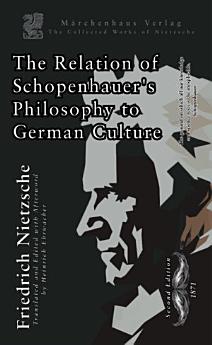The Relation of Schopenhauer's Philosophy to German Culture: A New Reader's Edition
May 2024 · The Collected Works of Friedrich Nietzsche Book 17 · Marchen Press
Ebook
98
Pages
family_home
Eligible
info
reportRatings and reviews aren’t verified Learn More
About this ebook
This is Nietzsche's critique of contemporary German society, culture, and philosophical engagement, juxtaposed with the philosophical ethos of Arthur Schopenhauer. This unpublished preface, intended for an unfinished book, articulates a lament for what is perceived as the degradation of German culture and education, attributing this decline to a general malaise and superficiality in intellectual and everyday life. Nietzsche begins by depicting modern Germany as a place overwhelmed by a desperate pursuit of happiness and greatness that paradoxically leads to cultural and intellectual mediocrity. This pursuit is portrayed as so dominant and destructive that it requires almost a leap of faith ("credo quia absurdum est") to believe in the possibility of genuine cultural renewal in this context. The critique extends to the German academic and cultural scene, which is described as philistine, historically obsessed but superficial, and ultimately disconnected from the genuine philosophical pursuit exemplified by Schopenhauer. Much of the text is devoted to dissecting the failings of what he calls "the educated man" in Germany. This figure is criticized for a historical consciousness that bypasses the profound and the sublime, opting instead for a comfort in mundane historical detail that shields him from deeper engagement with philosophical or existential truths. This approach to history and culture is seen as emblematic of a broader societal avoidance of the profound challenges and radical ideas presented by thinkers such as Schopenhauer. This manuscript, unpublished in Nietzsche's life, was first published in German in 1901 under the title "Nachgelassene Fragmente" by his sister, Elisabeth Förster-Nietzsche, along with other scholars. They were then re-published in various formats after that -including in a series titled "Gesammelte Werke" (Collected Works), later reorganized and expanded into the "Gesamtausgabe" (Complete Edition), which included comprehensive collections of Nietzsche's notebooks and other writings from various periods of his life. This Critical Reader's Edition offers a modern translation of the original manuscript, designed to help the armchair philosopher engage deeply with Nietzsche's works. The translation features clean, contemporary language with simplified sentence structures and diction, making Nietzsche's complex ideas more accessible. In addition to the main text, this edition includes extensive supplementary material that enhances the manuscript with autobiographical, historical, and linguistic context. It contains an afterword by the translator examining the history, impact, and intellectual legacy of Nietzsche in relation to this work, an index of philosophical concepts with emphasis on Existentialism and Phenomenology, a complete chronological list of Nietzsche's published writings, and a detailed timeline of his life, highlighting the personal relationships that significantly shaped his philosophy.
About the author
Friedrich Nietzsche (1844-1900) was a watershed German philosopher, cultural critic, poet, musician (briefly) and philologist (the study of ancient manuscripts) whose work has had a profound impact on modern intellectual history. Known for his critiques of European morality and religion (particularly Protestantism), Nietzsche's ideas on the "will to power" and the "Übermensch" have influenced a wide range of philosophical, literary, and psychological thought including thinkers such as Martin Heidegger, Albert Camus, Michael Foucault and the entire Postmodern religion.
Rate this ebook
Tell us what you think.
Reading information
Smartphones and tablets
Install the Google Play Books app for Android and iPad/iPhone. It syncs automatically with your account and allows you to read online or offline wherever you are.
Laptops and computers
You can listen to audiobooks purchased on Google Play using your computer's web browser.
eReaders and other devices
To read on e-ink devices like Kobo eReaders, you'll need to download a file and transfer it to your device. Follow the detailed Help Center instructions to transfer the files to supported eReaders.











